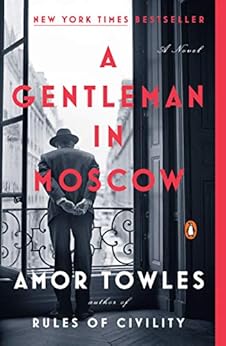This was an especially interesting book to read during self-isolation because of the Covid-19 pandemic: the protagonist, Count Alexander Rostov, is not allowed to step outside his home. He is given a life sentence of house arrest: he will be killed if he ever leaves the confines of the Metropol Hotel. He is stripped of most of his possessions and removed from his luxury suite to a garret room measuring 100 square feet. The Count understands that “if a man does not master his circumstances then he is bound to be mastered by them” and so sets out to make his whole world out of the hotel and the people in it.
The novel spans 32 years, from 1922 to 1954. There are major events in Russian history
during this time, but they remain in the background. The focus is on how the changes in the world
outside affect the Count’s life: “History
is the business of identifying momentous events from the comfort of a high-back
chair.” Often the turbulence of history
is reflected in the food served in the hotel restaurant where the Count eats
and eventually becomes the head waiter: the
chef‘s saltimbocca is “fashioned from necessity. In place of a cutlet of veal, Emile had
pounded flat a breast of chicken. In
place of prosciutto de Parma, he had shaved a Ukrainian ham. And in place of sage . . . nettle.” It takes the Count and two friends three
years to find all 15 ingredients needed to make bouillabaisse. And the Count cannot get the wine he wants
because the government has mandated that all bottles be stripped of labels so
only red and white wine can be sold with every bottle at a single price: “’the existence of a wine list runs counter to
the ideals of the Revolution. . . . it is a monument to the privilege of the
nobility, the effeteness of the intelligentsia, and the predatory pricing of
speculators.’”
Though the Count cannot leave the hotel, he reads the newspaper to
learn about events. Because the hotel is
across from the Kremlin, those responsible for events (e.g. Khrushchev) inevitably
find their way to the hotel where the Count observes them and makes astute
conclusions. The Count also befriends many
people. His best friends within the
hotel are the chef, the maître d’, and a precocious 9-year-old girl, but he
also becomes friends with an American general’s aide-de-camp, a beautiful
Russian actress, and an officer of the Communist Party who is “’charged with
keeping track of certain men of interest.’”
So though his world may seem small, it really isn’t.
There are wonderful touches of humour.
When a waiter recommends an inappropriate wine to accompany a Latvian
stew, the Count muses, “Now there was a wine that would clash with the stew as
Achilles clashed with Hector. It would
slay the dish with a blow to the dead and drag it behind its chariot until it
tested the fortitude of every man in Troy.”
When unable to sleep, the Count doesn’t resort to the remedy of counting
sheep because he prefers “to have his lamb encrusted with herbs and served with
a red wine reduction.” An immoderate
young man keeps refilling his glass with wine and has extra helpings of a beef
roast so eventually he returns “his supper to the pasture from whence it came.”
The Count is a Renaissance man.
He is a gourmand and an oenophile.
He is knowledgeable of the literature of several languages. He tutors a Communist official on French,
English and American culture. He is an intelligent,
witty conversationalist and an expert on etiquette. All of this should make him insufferably
annoying, but he isn’t. He does not
consider himself superior to others; he treats others with kindness and respect,
though he has little patience for those who have not earned their positions
through skill and hard work. He is not
bitter, but accepts his sentence with grace and dignity, and remains true to
his principles. He is unfailingly
composed, refined, and polite – a true gentle man and gentleman.
The diction is formal and sophisticated, language appropriate to an
erudite protagonist. The novel is
elegant and charming, again like the protagonist. Reading
the book is what I imagine a conversation with the Count would be like; I came
away having learned much after having spent a most pleasant time which I would love
to repeat.

No comments:
Post a Comment